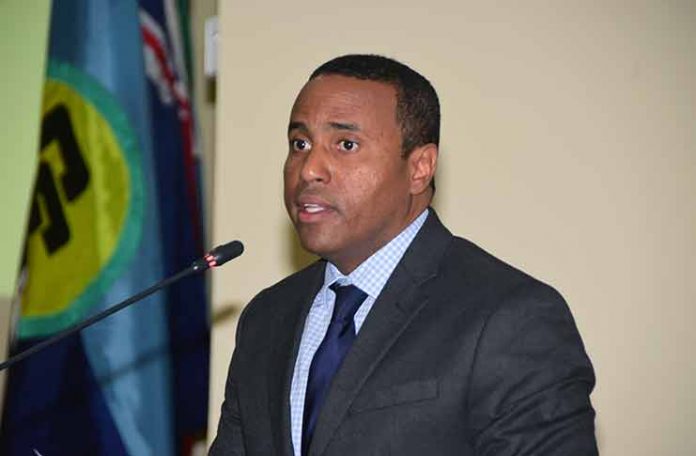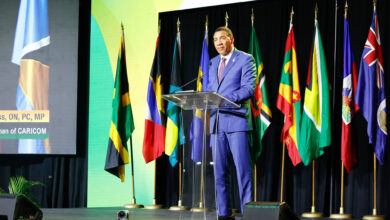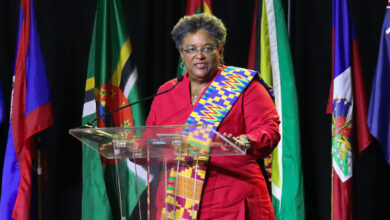Salutations
Good Morning All:
It is indeed a great pleasure to be with you today and tomorrow as we discuss this very important topic of the Caribbean Single Market and Economy (CSME). We are particularly happy at the Caribbean Development Bank (CDB) to support these discussions.
At this this point in time the CSME is critical for our Region.
We recently published a working paper entitled the Blueprint for the Caribbean Economy (it is available online). In this report we set out the challenges that the Caribbean face and we have categorised these challenges under:
(a) Macroeconomic;
(b) Productivity and Competitiveness;
(c) Social and Human Development; and
(d) Environmental.
We are all aware of the many challenges that our beautiful Region faces, but let me just touch on some of these now.
Macroeconomic
CDB’s Borrowing Member Countries (BMCs) have recorded some of the lowest economic growth rates on average since the Great Recession of 2007 (less than 2%). When we compare our growth to that of other small states we are lagging. But the growth is not even, last year the range was negative 6.9% to positive 4.5%. In addition, our debt is at unsustainable levels, again not evenly distributed ranging from 6% of Gross Domestic Product (GDP) to 157% of GDP at the end of 2017. A major reason for this is that we are spending a lot on wages and salaries, and on transfers and subsidies. Foreign currency reserves are in the main above the three-month threshold, but two of our countries have reserves that are less than this desired amount.
Productivity and Competitiveness
In a recent working paper and at our Board of Governors’ meeting last week, I revealed that while extra-regional travel increased significantly between 2006 and 2016, intra-regional travel declined by 1.8%.
The doing business environment has also moved in the wrong direction. Our average rank was 59 out of 178 countries in 2008, and now we are at 123 out of 190 countries.
Social and Human Development
Unemployment rates are also high in many of our BMCs. In countries where unemployment data is available it is as high as 25% and as low as 4.3%; and youth unemployment is even higher, as much as 40% in some BMCs.
For many of our BMCs by 2100 we expect their populations to decline. Jamaica’s population is expected to decline by 50%; Trinidad and Tobago’s by 28%; St. Vincent and the Grenadines’ by 29%; and Grenada is expected to have less people than it had in 1950. But population dynamics are changing rapidly around the world. It is forecasted that the share of population will change dramatically by 2100. North America currently has 5% of world population. This will decrease to 4% in 2100; Europe will go from 10% to 6%; Asia will decline from 60% to 43%; but Africa will rise from currently 17% to 40%. I repeat to 40%. Are we ready for these changes?
Returning to our own populations, in fact when we look at the data, many of our countries have lost as much as 70% of their labour force with more than 12 years of completed schooling (i.e. with tertiary education). Research done by Mishra in 2006, suggests that the losses due to high˗skilled migration ceteris paribus, outweigh the official remittances to the Caribbean Region.
Environment
On the environment, last year again highlighted how vulnerable our Region is to natural disasters. In 1989, Hurricane Hugo caused damage costs amounting to 434% of GDP in Montserrat; Hurricane Ivan, in 2004, caused losses amounting to 200% of GDP in Grenada; and in 2015, Storm Erika caused losses of 96% of GDP in Dominica, and in 2017, Hurricane Maria caused losses of 225% of GDP.
Ladies and Gentlemen in this Blueprint publication, we suggest that, given our challenges in each of the quadrants, it is time for us to step back in order to jump better. We can flip those challenges that I have spoken about and boost the resilience of our Region, for example by implementing fiscal rules and for governments to have rainy-day funds or Sovereign Wealth Funds. Also to ensure that: (a) all children have access to good quality education and are ready for the future labour markets; (b) strict building codes are enforced; (c) there is a correct level of Caribbean Catastrophe Risk Insurance Facility coverage; and (d) they are actively investing in smart infrastructure and dismantling the barriers to doing business and trade.
We believe that ultimately, building resilience must start at the household level. A resilient household means a resilient society and economy. However, we identified a number of cross˗cutting themes that will bind all of this together, including: gender equality; digital integration; regional integration and implementation.
Let me end by saying something about the last two. The purpose for being here today and tomorrow is to move forward what, in my mind, is critical not just for economic growth and transformation and the social progress of our Region, but also critical for resilience building. Our people need the ability to move without restrictions, and we need to trade freely so that our firms can build economies of scale to take advantage of global population trends. But, finally, I urge you today that we must leave Georgetown tomorrow with a laser focus on implementation. By this I mean that, we must stop working in old ways and begin to look at New Ways of Working.
This means:
(a) Identifying the priorities for moving the CSME forward.
(b) Gathering the best people from across the Region, government, private sector, labour, civil society, placing them in a room for about two months so that they can devise an implementation plan for these priorities.
(c) We communicate these implementation plans with budgets (since a plan without a budget is just a draft, and we shall not publish drafts) to our populations so that we receive feedback, but ultimately buy-in after feedback has been incorporated.
(d) We determine who is responsible for implementation and we set Key Performance Indicators.
(e) We focus on implementation via a delivery unit.
(f) We ask persons responsible to report to us at the end of each year, on December 31st, about how they have succeeded in what they said that they were going to do during the year.
(g) We publish audited annual reports of progress.
(h) We bring a new level of accountability to our implementation, which should help move us towards our desired CSME outcome.
Ladies and gentlemen I thank you and I wish us all a fruitful one-and-a-half days of discussion, but importantly that we move towards implementation.
Press ReleasesSpeeches
Remarks, Dr. Justin Ram, Director of Economics, CDB, at Stakeholder Consultation on CSME, Georgetown, Guyana, 8 June, 2018






